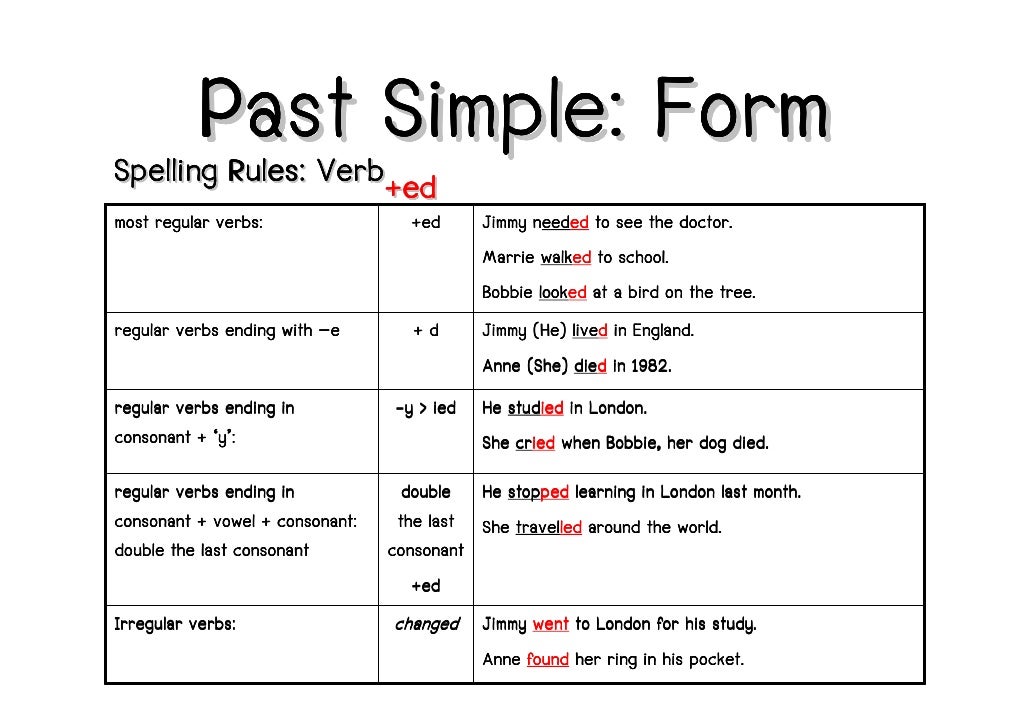
F2F Past Simple
Past Simple Spelling rules for regular verbs Top English 6.55K subscribers Subscribe 214 Share 19K views 6 years ago Regular verbs have a common way in Past tense. Let's take a look at the.
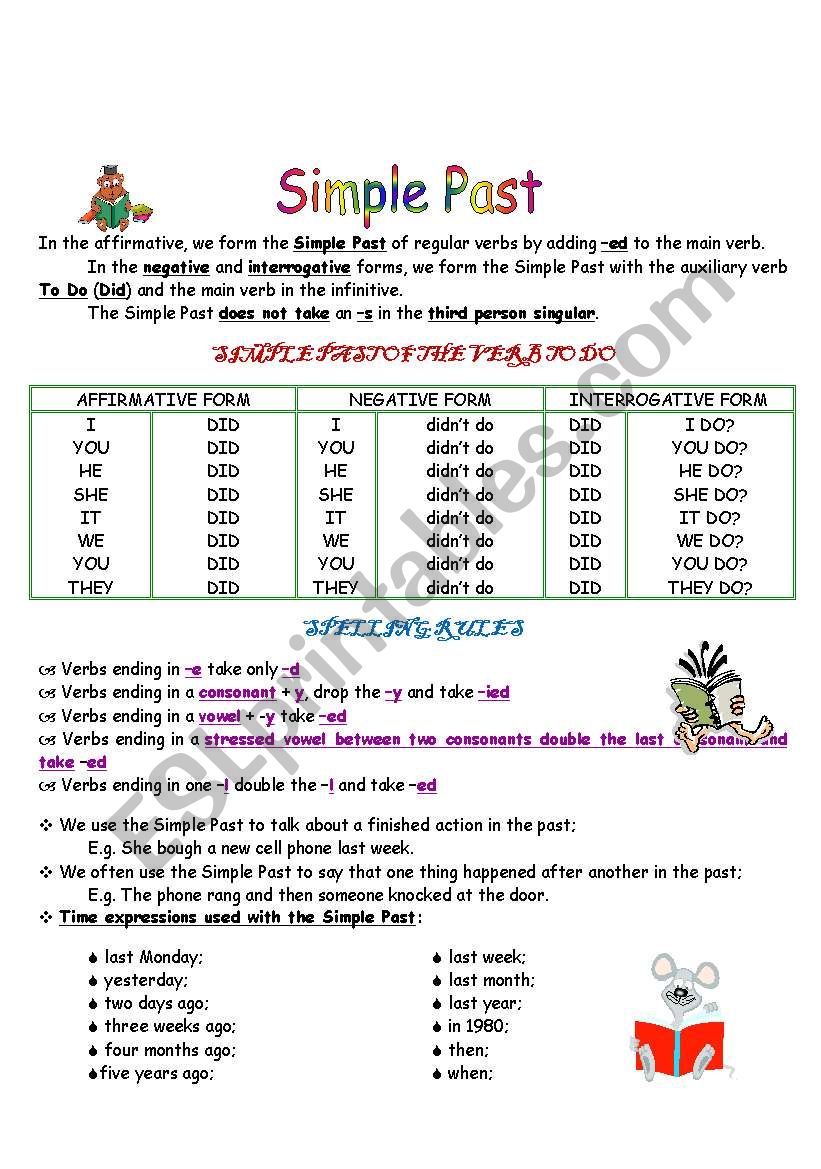
Simple Past spelling rules ESL worksheet by montesdegira
English Grammar Verbs Past tense Past simple Past simple Level: beginner With most verbs, the past tense is formed by adding -ed: called liked wanted worked But there are a lot of irregular past tense forms in English. Here are the most common irregular verbs in English, with their past tense forms: We use the past tense to talk about:
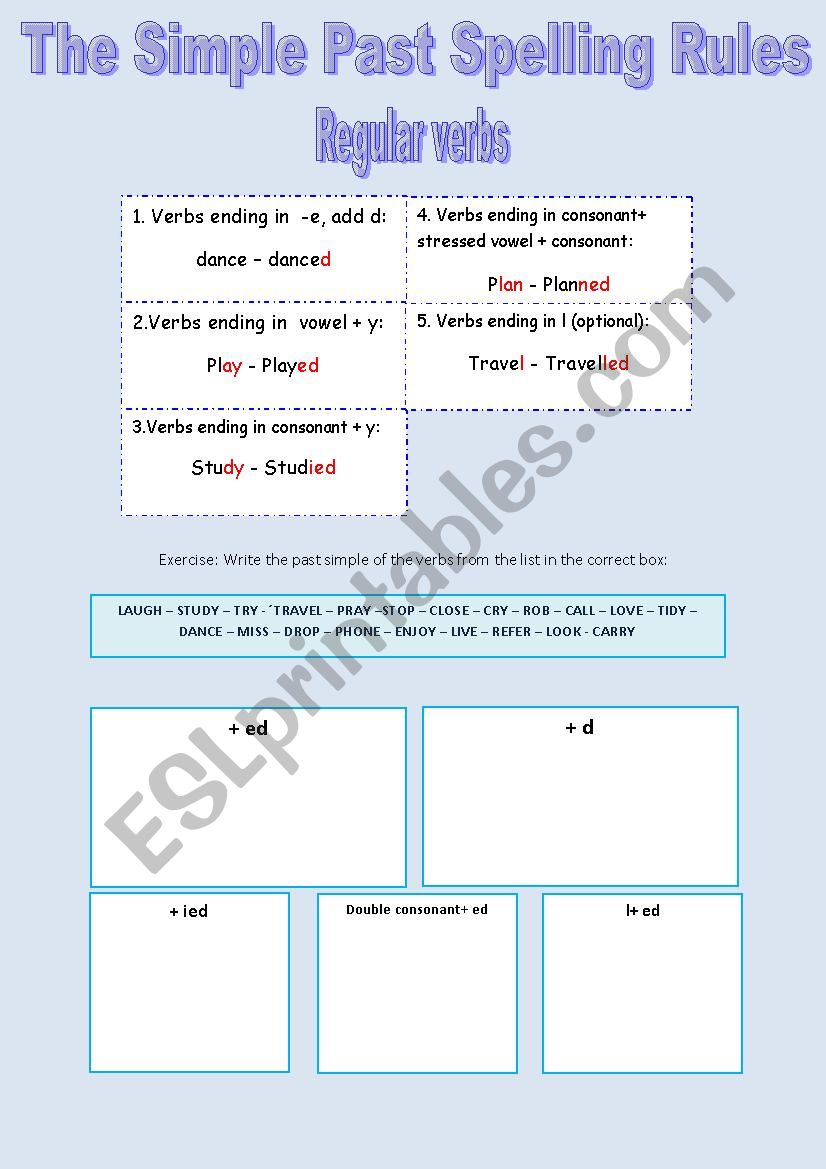
SIMPLE PAST SPELLING RULES ESL worksheet by barbarachiote
Rule #1 If a verb ends in -e, add -d. like → liked arrive → arrived decide → decided Rule #2 If a verb ends in consonant + -y , change -y to -i and add -ed. carry → carried try → tried study → studied Rule #3 If a verb ends in vowel + -y, add -ed .* play → played stay → stayed enjoy → enjoyed Rule #4

past simple of regular verbs worksheet Regular verbs, Simple past tense, Simple past verbs
The Simple Past Tense Usage. The Simple Past is used: To express completed action in the past. Example: I saw a ghost last Friday. To describe a series of completed actions in the past. Example: I finished work, walked to the beach, and found a nice place to swim. To express habits in the past.
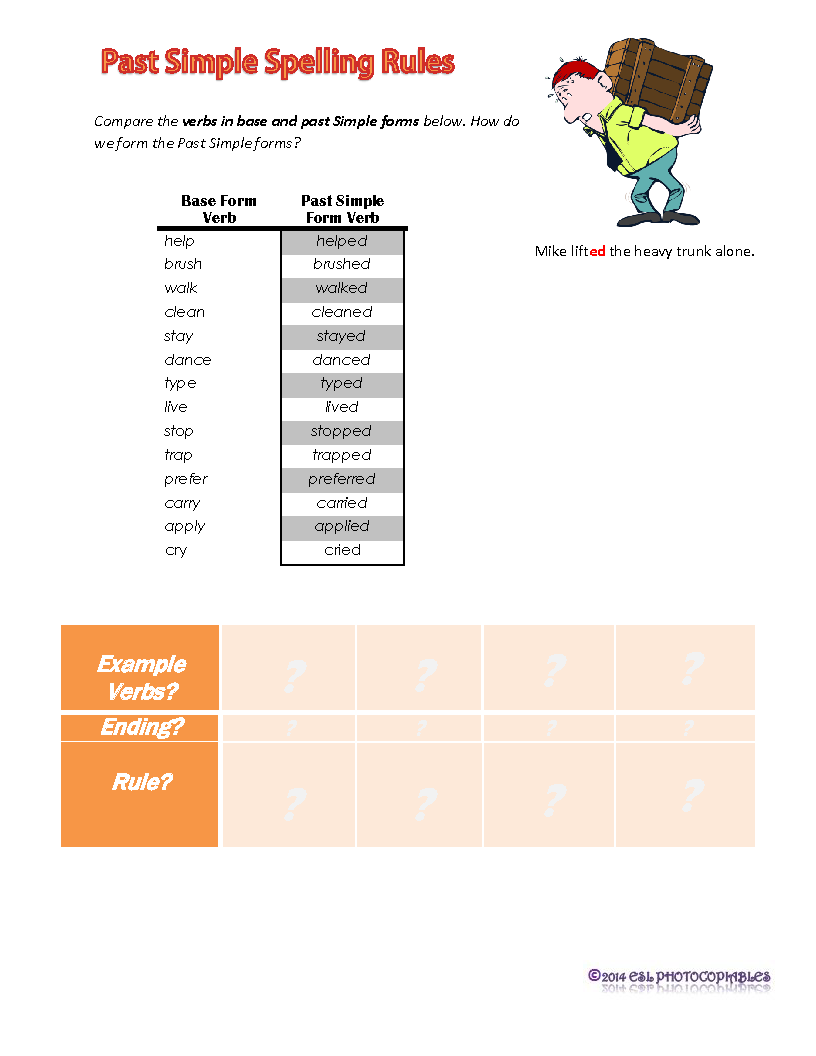
Spelling Rules in Past Simple Tense Regular Verbs photocopiables
The past simple tense is quite straightforward. The main problem is its spelling rules, which you'll find below. We use the past simple to describe an action that started in the past and ended in the past. It could be something that happened twenty years ago or something that happened two minutes ago. It started. It stopped. It's over.
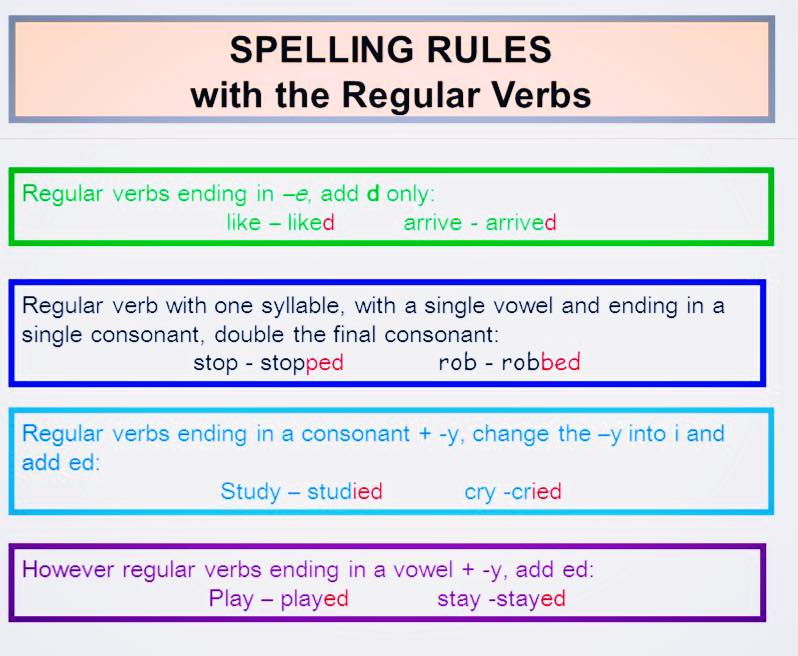
Click on 'ED' REGULAR PAST, PRONUNCIATION & SPELLING
Rules and Points to Remember When Using the Simple Past Tense. When conjugating a verb in the simple past tense, there are a few points you have to bear in mind.. Conjugating regular verbs - In order to present the main verb in the sentence, you just have to add '-ed' to the end of the regular verb and '-d' to the end of a regular verb which ends with an 'e'.

Rules 1. Past Simple "ed" Spellin… English ESL worksheets pdf & doc
All ages. Grades 6-12. These spelling rules make forming the past tense for regular verbs a lot easier. Students can review this reference when they need to add the simple past ending (ed) to a base verb. Includes a practice exercise.

Simple past ( spelling and pronunciation rules ) First intermediate grade YouTube
Learn the PAST SIMPLE tense in English with this easy grammar explanation tutorial (SIMPLE PAST). Learn the STRUCTURE, SPELLING RULES and PRONUNCIATION of re.

English Grammar Simple Past Tense Regular Verbs Jeffrey Cox's English Worksheets
The simple past is the basic form of the past tense in English grammar, we use it for: actions that happened once or repeatedly in the past Example: L ast month a girl from China joined our class. She was from China. She showed us where she was from on a map. actions that happened one after the other in the past Example:
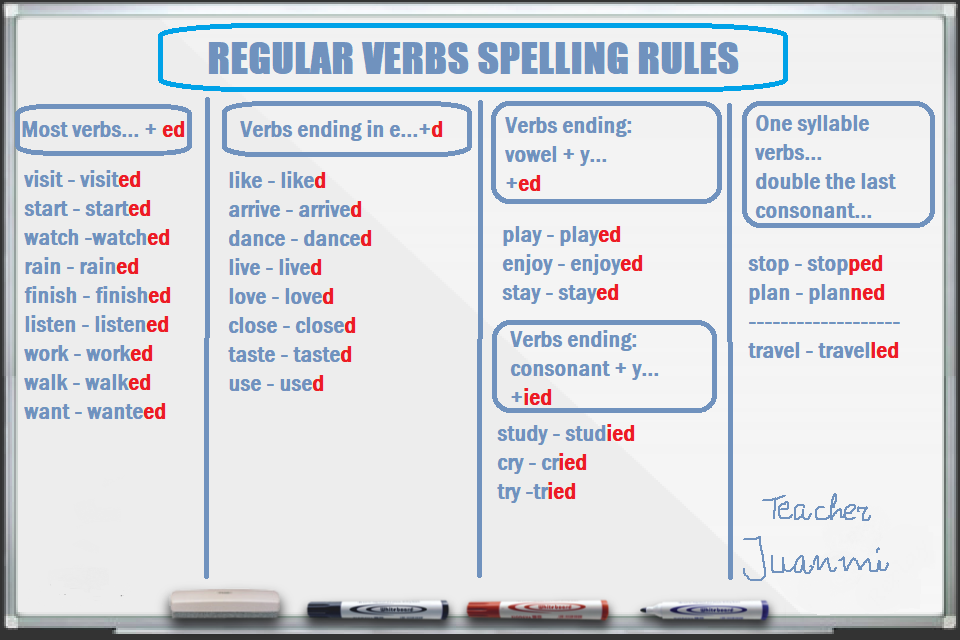
miteachertieneunblog Past Simple Regular Verbs Spelling Rules
Spelling Rules in Past Simple 0 We normally add -ed to the verb in all personal pronouns. When we can't use -ed, there are a few spelling rules according to the ending of the verbs. We double the last letters of the verbs with a CVC (consonant-vowel-consonant) pattern. However, we do not double the last letter of the verbs in two cases:

Past simple Form and use TestEnglish
45 0 1/1 Let's do English ESL general grammar practice. A grammar guide on spelling rules and -ed pronunciation and a simple matching exercise. Hope you can use it with…

Past Simple Spelling Rules PDF
Here is a full list of Irregular verbs in the past simple. Spelling Variations Usually, we add -ed to the verb. When the verb ends in e then we just add d(Create, Live, State). Sometimes we need to double the last letter like in the past simple for stop which is stopped.
+12.07.40.png)
Cecilia's English Corner. Past Simple.
How do you form the past simple? Regular past simple forms are formed by adding - ed to the infinitive of the verb. start → started kill → killed jump → jumped That seems easy! Yes, but there are some spelling rules. If a verb ends in - e, you add - d. agree → agreed like → liked escape → escaped

Past Simple Spelling Rules Poster English Material Pinterest English, English grammar and
How to spell regular and irregular verbs in the Simple Past You have to know all forms of irregular verbs very well. For the Simple Past you need the form of the verb which can be found in the 2nd column of the table of irregular verbs. go → went → gone Add -ed with regular verbs: regular verbs → infinitive + -ed

Past Simple Tense (Simple Past) Definition, Rules and Useful Examples • 7ESL Tenses grammar
The rules of the simple past tense forms: Here are the rules: Regular verbs ending in a silent e take /-d/ in the simple past and past participle: Example: clos e =clos ed Regular verbs ending in a vowel + y take /-ed/ in the simple past and past participle: Example: pla y =pla yed
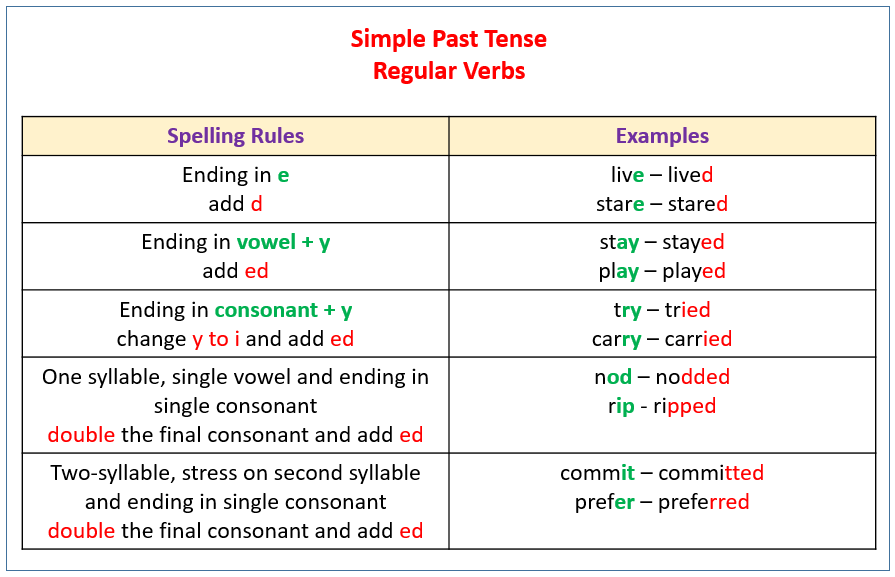
Simple Past Tense (examples, explanations, videos)
Past simple spelling rules In English we normally add -ed ending to a verb to make the past simple and the past participle of regular verbs. Past simple: I worked, you worked, he worked. Past participle: I have worked, you have worked, he has worked.